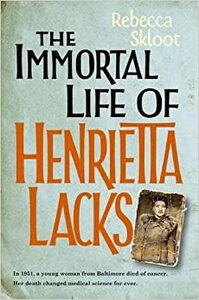Take a photo of a barcode or cover
A fascinating and important story that needs to be told in terms of what it reveals about race in the USA. For all that, there's something slightly artless and lack-lustre about the writing itself both in terms of its language and the way the work is structured.
This book does seriously read like a novel. I devoured it in two days, and wanted more. Rebecca Skloot does a fantastic job of painting a picture of this horribly frustrating situation and coming from both sides of it, letting the reader decide what they think about science and research, and humanity. The strong presence of the Lacks family made this book so well-rounded and personal, I found myself wanted to turn back the clocks so that no bad things could happen to them. And then there's so much scientific knowledge and discussion around the HeLa cells (that I truthfully had never heard of), yet nothing that will bog the reader down.
challenging
emotional
informative
reflective
slow-paced
emotional
informative
medium-paced
challenging
dark
emotional
hopeful
informative
inspiring
reflective
medium-paced
challenging
emotional
informative
sad
medium-paced
I picked up this book because my son had to read it for class. (I'm thinking of reading all the books he reads this year... except the ones I have already read.) He dislikes non-fiction, which is most of what his class will be reading, and so I want to be able to talk to him about the books, maybe make them a little more interesting to read.
I didn't start this book with any interest in the subject matter, but I found it engaging and well-written. I learned a lot about HeLa cells that I never knew before. That was the best part of the book, to me. I also learned a lot about scientific ethics of dealing with human tissues, and Henrietta Lacks' life, which held my attention. The sections about the family of Henrietta were interesting at first, but seemed to go on too long as the book wound down. Overall, it was a really good book, and I admire the author for spending about a decade gathering the materials to bring the story of Henrietta Lacks, and her HeLa cells, to light and life.
"It's good to know stuff... to be educated so you understand life and reality," is one of my takeaway discussion points from this book.
I didn't start this book with any interest in the subject matter, but I found it engaging and well-written. I learned a lot about HeLa cells that I never knew before. That was the best part of the book, to me. I also learned a lot about scientific ethics of dealing with human tissues, and Henrietta Lacks' life, which held my attention. The sections about the family of Henrietta were interesting at first, but seemed to go on too long as the book wound down. Overall, it was a really good book, and I admire the author for spending about a decade gathering the materials to bring the story of Henrietta Lacks, and her HeLa cells, to light and life.
"It's good to know stuff... to be educated so you understand life and reality," is one of my takeaway discussion points from this book.
This book definitely gives new meaning to civil rights.
Henrietta Lacks was a poor, African-American mother of five who died in 1951 of cervical cancer, whose cells were taken from a biopsy before her death to be used for research. The cells, which were cultured by George Otto Gey, created the first known human immortal cell line for medical research. This is now known as the HeLa cell line. Rebecca Skloot does an excellent job of telling who Herietta Lacks was, and how her family was affected by the decision to use her cells in medical research.
The medical advancements that have been made through the use of the HeLa cell line is amazing. And just amazing, how this decision affected Henrietta's family.
Henrietta Lacks was a poor, African-American mother of five who died in 1951 of cervical cancer, whose cells were taken from a biopsy before her death to be used for research. The cells, which were cultured by George Otto Gey, created the first known human immortal cell line for medical research. This is now known as the HeLa cell line. Rebecca Skloot does an excellent job of telling who Herietta Lacks was, and how her family was affected by the decision to use her cells in medical research.
The medical advancements that have been made through the use of the HeLa cell line is amazing. And just amazing, how this decision affected Henrietta's family.
Henrietta Lacks died of cervical cancer in 1951. Dr. George Gey took her cancer cells without permission and used them in his scientific experiments. Her cells became the first ones to be replicated in a lab and then subsequently distributed to scientists and researchers around the world. From her cells we were able to develop the polio vaccine, gene mapping, and learn the effects of radiation and toxic substances on cells. We also were able to begin to research cancer, aids, gravitational effects on the body, and an innumerable variety of other scientific studies.
In this book Rebecca Skloot explores the hardships that faced people of color during the mid-1900’s and up through today. She weaves two tales: the story of the Lacks family and the story of Henrietta’s cells. Both stories take you down the path of wrestling with the ethical issues involved with medicine in the past, present, and future.
This book was eye opening for me and helped me to better understand the issues of our day. This book is important as it highlights the horrors of bad scientific ethics and how they played out in the Tuskegee Trials, Henrietta’s Story, and modern-day. In exploring these paths, Skloot brings to light many truths that are left out of history books and have helped to create some of the divides that plague our country.
If you’re worried that reading a book about science and history will be boring and uneventful, set those concerns aside and pick up this book. It’s riveting, engaging, and will have you examining your own motives. You will undoubtedly find yourself changed by this book.
To see more reviews check out my blog: This Sporadic Life
In this book Rebecca Skloot explores the hardships that faced people of color during the mid-1900’s and up through today. She weaves two tales: the story of the Lacks family and the story of Henrietta’s cells. Both stories take you down the path of wrestling with the ethical issues involved with medicine in the past, present, and future.
This book was eye opening for me and helped me to better understand the issues of our day. This book is important as it highlights the horrors of bad scientific ethics and how they played out in the Tuskegee Trials, Henrietta’s Story, and modern-day. In exploring these paths, Skloot brings to light many truths that are left out of history books and have helped to create some of the divides that plague our country.
If you’re worried that reading a book about science and history will be boring and uneventful, set those concerns aside and pick up this book. It’s riveting, engaging, and will have you examining your own motives. You will undoubtedly find yourself changed by this book.
To see more reviews check out my blog: This Sporadic Life
What an amazing book! Fascinating! I am in shock of my years studying science, that I was not aware of the story behind HeLa cells. Great book for medical ethics debates and discussions.


